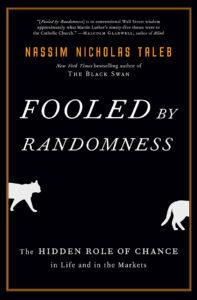Book Summary: Fooled by Randomness by Nassim Nicholas Taleb
Buy the book: Print | Ebook | Audiobook
Or, browse more book summaries
The Book in Three Sentences
“Fooled by Randomness” by Nassim Nicholas Taleb explores the concept of luck and how it can influence success and failure in business and life. Taleb argues that people often mistake luck for skill, which can lead to overconfidence and risky decision-making. He suggests that understanding the role of chance and uncertainty can help individuals make more informed and realistic choices.
Book Summary
“Fooled by Randomness” is a book by Nassim Nicholas Taleb that discusses the concept of luck and the role it plays in our lives. The book is divided into four sections, each discussing different aspects of how randomness affects our decisions and outcomes.
Section One: Solon’s Warning
The first section of the book introduces the reader to the idea of randomness and how it can be deceiving. Taleb explains how humans have a natural tendency to attribute success and failure to their own abilities, rather than to chance. This can lead to overconfidence and poor decision-making. He uses the story of Solon, a wise ancient Greek leader who warned a wealthy king about the dangers of attributing success to personal skill, to illustrate this point.
Section Two: Skewness and Asymmetry
The second section of the book discusses the concept of skewness and how it affects our understanding of probability. Taleb explains that traditional probability models assume a normal distribution, where outcomes are evenly distributed around a mean. However, in real life, outcomes are often skewed, with extreme events occurring more frequently than expected. He argues that understanding skewness is essential for making good decisions in a world where unpredictable events can have a significant impact.
Section Three: Survivorship Bias
The third section of the book focuses on survivorship bias, which is the tendency to focus on successful people or businesses and ignore those who failed. Taleb argues that this bias can lead to incorrect conclusions about the factors that lead to success. He suggests that we should study both successful and unsuccessful outcomes to gain a more accurate understanding of the factors that contribute to success.
Section Four: Randomness in Practice
The fourth and final section of the book applies the concepts discussed in the previous sections to real-world scenarios. Taleb discusses how randomness affects financial markets, entrepreneurship, and scientific research. He emphasizes that understanding the role of chance and uncertainty is crucial for making informed decisions in these areas.
Conclusion
In conclusion, “Fooled by Randomness” is a thought-provoking book that challenges our assumptions about success and failure. Taleb argues that randomness plays a more significant role in our lives than we often realize, and that understanding its impact is crucial for making good decisions. The book is well-written and accessible, with plenty of real-world examples to illustrate the author’s points. It is a must-read for anyone interested in probability, decision-making, and the role of chance in our lives.
Important quotes
About Author of "Fooled by Randomness"
Nassim Nicholas Taleb is a Lebanese-American essayist, scholar, and former options trader, born on 1st January 1960 in Amioun, Lebanon. He has a diverse background with a degree in Mathematics from the University of Paris and an MBA from the Wharton School of the University of Pennsylvania.
Taleb has written numerous books on probability, statistics, and risk management, including his bestselling trilogy “Incerto”, which includes “Fooled by Randomness”, “The Black Swan”, “Antifragile”, and “Skin in the Game”. He has also been a professor of risk engineering at New York University’s Tandon School of Engineering and has worked as a derivatives trader in various financial institutions.
Taleb is known for his criticism of modern finance and economics, arguing that they do not adequately account for the role of randomness and uncertainty in real-world events. He has also been a vocal critic of academic research, arguing that it often fails to address practical problems and is more concerned with theoretical models than with real-world applications.
Overall, Taleb is a highly influential and controversial thinker whose work has challenged conventional wisdom in fields ranging from finance and economics to philosophy and ethics.
Book Summary: Fooled by Randomness by Nassim Nicholas Taleb
Buy the book: Print | Ebook | Audiobook
Or, browse more book summaries


